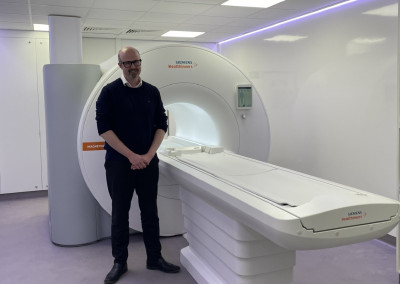
The low-field MRI scanner, which was awarded by the National Institute of Health and Care Research (NIHR) as part of a national investment in clinical research facilities, is more cost and energy-efficient than its standard counterparts.
Where a standard MRI scanner can use over 1,000 litres of liquid helium to keep the machine cool during use, the low-field scanner uses only 0.7 litres. This is due to its lower-strength magnet producing less heat.
It also has a wider bore which will help claustrophobic patients feel more comfortable when having their scan.
Dan Knight, consultant cardiologist, said: “The installation of the low-field MRI research scanner means we will be able to expand our imaging research in cardiovascular diseases, such as patients with pulmonary hypertension who have increased blood pressure in their lungs.
“Another advantage of low-field MRI is that it is less likely to interfere with metal devices inside the body, making it possible for us to trial devices that are not available to us in a standard, higher field strength MRI scanner. The low-field MRI also creates clearer pictures around tricky areas like the lungs, offering a great opportunity for patients with lung diseases, who usually have to have X-rays or CT scans, to benefit from imaging without radiation.”
The RFH will become one of only two sites in the UK to use a low-field MRI scanner for cardiac MRI scans and aims to be the only UK site to use it to perform right heart catheterisation, a procedure where imaging is used to guide a catheter tube to the heart and lungs to help diagnose conditions such as pulmonary hypertension.
Lucy Parker, interim director of research and development at the RFL, said: “The addition of this scanner to our research facility will widen the portfolio of studies we are able to participate in and the type of research we can carry out. Alongside the remaining NIHR funding we received in 2023 to upgrade and expand our research facilities, this will enable us to further research and innovation at the RFL.”
The clinical research facility hosts world-leading, early-stage and complex experimental studies at the RFH. Research is a key part of the RFL’s tripartite mission: to be world class in terms of our healthcare services, clinical research and teaching excellence.
The RFL participates in over 200 research projects each year, involving more than 13,000 patients in clinical research. The trust is the 10th best in the NHS for recruitment into NIHR- adopted studies according to studies in 2022-2023.
 Translate
Translate